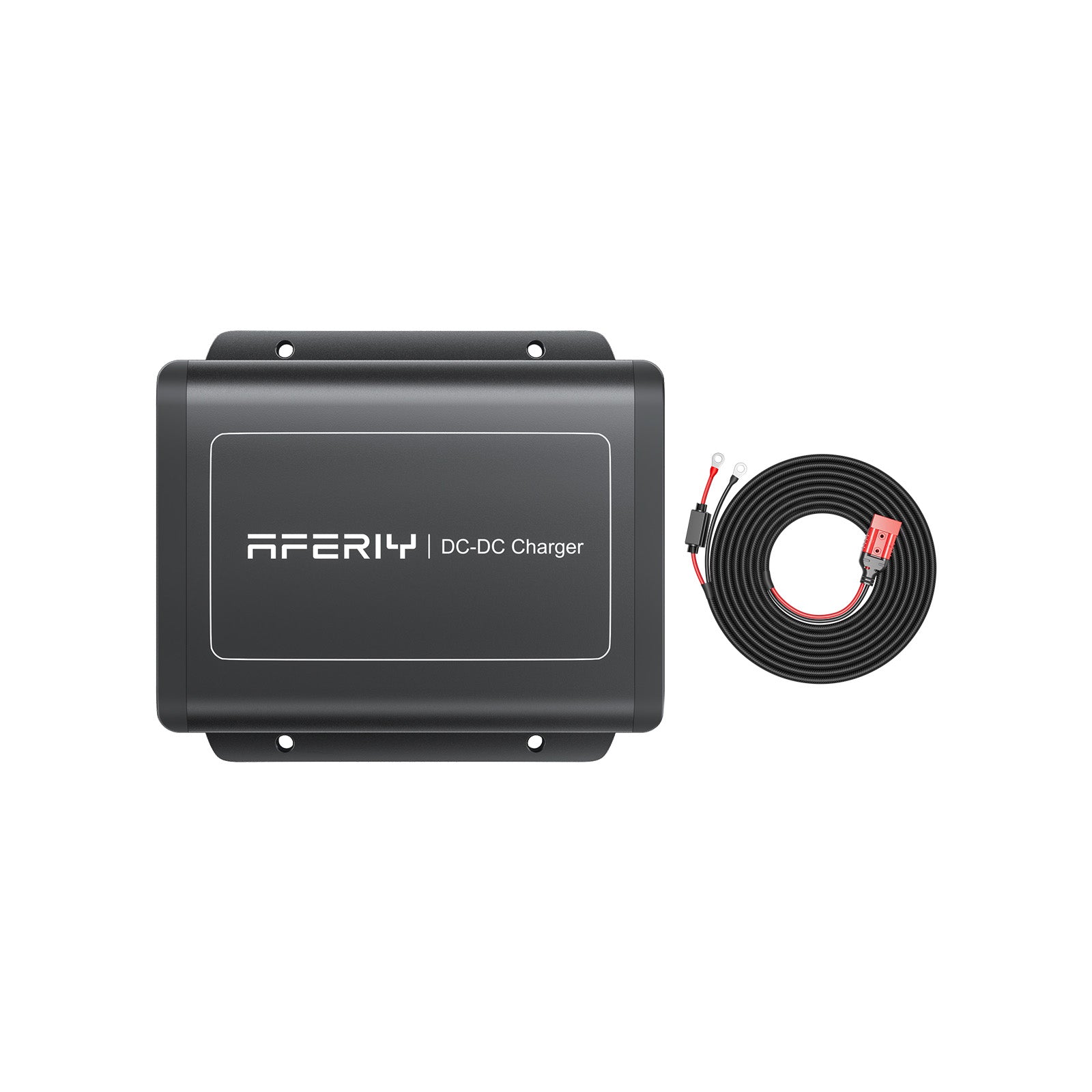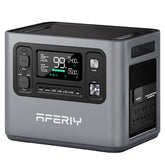What is the Difference Between a Power Bank and a Portable Power Station?
As our reliance on portable electronics like smartphones continues to grow, keeping them charged on the go becomes more important. Portable power stations and power banks have both gained significant traction as dependable sources of portable electricity. While power banks have been a popular and convenient way to charge our devices on the go, portable power stations have recently emerged as a more versatile, robust option.
In this guide, we will compare these two options in depth and explore the key differences among their capacities, charging abilities, portability, costs, and ideal uses.
What is a Portable Power Station?
A portable power station is a high-capacity and rechargeable battery pack designed to store electricity for recharging and powering devices. It features AC outlets, DC outlets, USB ports, and occasionally specialised ports like car outlets. This allows you to power a broad range of devices, including laptops, TVs, and even small kitchen appliances.

Pros of Portable Power Stations
- High capacities from 3kWh to over 70kWh to run devices for hours or days.
- AC and USB outputs allow the charging of laptops, phones, and small appliances.
- Recharge from solar for renewable off-grid power.
- Compact and portable design improves portability over generators.
- Backup home essentials during power outages.
Cons of Portable Power Stations
- More expensive than power banks, with prices from £200 up to £2000.
- Heavier than USB power banks - weight increases with higher capacity.
- Larger capacity models lack an IP68 waterproof and dustproof rating because it could interfere with their ability to dissipate heat and might limit access to charging ports and other interfaces.
- Most are not intended for high-draw devices like HVAC units.
What is a Power Bank?
A power bank, also known as a portable charger, is a compact battery charger designed for smartphones and other small devices. Their capacities can range anywhere from 1,000 to 50,000 mAh from various brands. Moreover, their sizes can vary from being able to fit in your pocket to being carried in a backpack.

Pros of Power Banks
- Extremely compact and lightweight - easy to carry in purses, backpacks, or pockets.
- Affordable prices from £20 to £100.
- Quickly charge modern USB-powered electronics and devices.
- Most can charge multiple devices simultaneously.
- No power inverter needed - charges devices natively via USB.
Cons of Power Banks
- Limited capacities from 3,000mAh to 30,000mAh restrict runtime for larger devices.
- Recharge only via USB - no direct solar or wall charging capabilities.
- Not suitable for powering appliances with household AC outlets.
- May slowly lose charging capacity over time after years of use.
- Incompatible with some older or proprietary device connectors.
Key Differences Between Power Banks and Portable Power Stations
Now that we've taken a quick look at the basics of both portable power options, let’s directly compare their key differences and intended purposes. This will help you decide which portable power solution will meet your requirements.
Power bank vs portable power station: A Quick Look Sheet
| Factor | Portable Power Station | Power Bank |
| Battery Capacity | 10,000 mAh and higher | 1,000 to 10,000 mAh |
| Power Output | 200 W and Higher | 3.7 to 185 W |
| Weight and Size | Bigger and heavier | Lightweight and Portability |
| Power Output Ports | Multiple ports, including AC, DC, USB ports | Usually USB ports only |
| Charging Method | AC outlet, car charger, solar panels | USB connection only |
| Cost | £200 – £2000 | £20 – £100 |
Battery Capacity and Power Output
One of the biggest differences between portable power stations and power banks is their power output and capacity.
Portable Power Stations: A portable power station has a higher battery capacity compared to power banks. It may range from 10,000 mAh and higher.

Power Banks: Generally speaking, a power bank has a battery capacity from 1,000 to 10,000 mAh.
Weight and Size
Portable Power Stations: While portable power stations are designed to be transportable, even if they come with handles and wheels, they may have a bigger size and higher weight due to their battery capacity.
Power Banks: Power banks are generally smaller, more lightweight, and more portable than power stations. They are easy to slip into a bag or even a pocket, making them ideal for travel or long commutes.

Power Output Ports
Portable Power Stations: They feature multiple power outputs, including AC outlets, DC outlets, and USB ports. So you can power and recharge a variety of devices, such as smartphones, tablets, and some medium appliances.
Power Banks: Mainly designed to charge smaller mobile electronics through USB ports.

Charging Method
Portable Power Stations: These devices often offer more flexibility in charging methods. They can be charged via a wall outlet, car charger, or even solar panels.
Power Banks: Power banks are typically charged via a USB connection to computers or power strips.

Cost
Portable Power Stations: These devices are generally more expensive than power banks. You may spend £200 to £2000 for one based on features and capacities.
Power Banks: Power banks are generally less expensive and are a cost-effective solution for keeping your devices charged on the go. Typically £20 to £100 for most models.
How to Choose Between a Power Bank and a Portable Power Station
When deciding between a portable power station and a power bank, there are several factors to consider to determine the best option for your specific needs.
Recommended Usage Scenarios
| Usage Scenarios | Portable Power Station | Power Bank |
| Daily commute | ✅ | |
| Off-grid living | ✅ | |
| Home backup for emergency | ✅ | |
| Power outages | ✅ | |
| Powering high-power output devices | ✅ | |
| Powering multiple devices | ✅ | |
| Long camping trips | ✅ | |
| Ultralight hiking | ✅ | |
| Campervan/Motorhome trips | ✅ | ✅ |
| Light use / powering small devices | ✅ | |
| Powering phone during flights | ✅ |
Your Power Needs
Evaluate your power needs first before you make a decision. If you need to power multiple electronics and appliances, or if you are going to spend days camping, a portable power station is recommended.
On the other hand, if you primarily need an ultra-portable source of USB charging for smaller personal electronics like smartphones, tablets, or wireless headphones, a compact power bank may fulfil your needs.
Your Budget
Budget is another consideration in your decision. A best budget portable power station offers greater functionality through AC outlets and higher capacity but come at a higher price point than basic power banks. Determine how much you can reasonably spend, and choose the product that provides the most value for the price.
Conclusion
To summarise, power banks and portable power stations are handy solutions for emergency power backup. When evaluating portable power stations versus power banks, consider your specific energy needs and which device capabilities are most suited to the scenarios when you depend on a portable power source. For home backup power or off-grid full-appliance charging flexibility, power stations are the way to go. To toss an ultra-light charger in your bag or glovebox for phone and tablet charging on the fly - power banks fit that purpose. Determine how much capacity and which charging options you require to choose the right portable power solution for your needs and budget.























1 comment
This is a really helpful comparison of portable power stations and power banks. As someone who is often on the go and needs reliable power for my devices, I found the breakdown of the key differences between these two options to be very informative.
The details on battery capacity, charging speeds, and portability were particularly useful in understanding the tradeoffs between the two. I appreciate the objective analysis – it will definitely help me decide which type of device best fits my needs and usage.
Thanks for putting together such a comprehensive guide on this topic. It’s given me a much clearer understanding of the pros and cons of portable power stations versus traditional power banks. Bookmarking this for future reference!
Leave a comment
Please note, comments need to be approved before they are published.